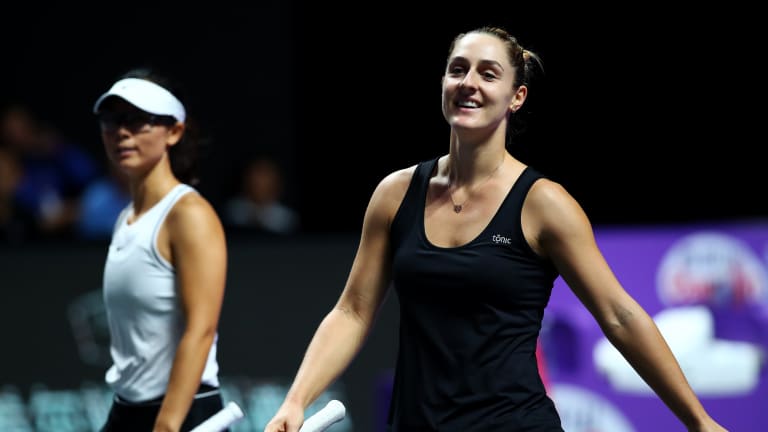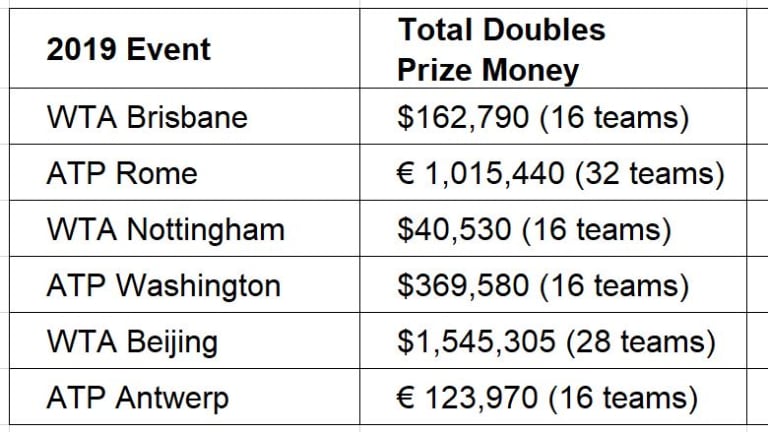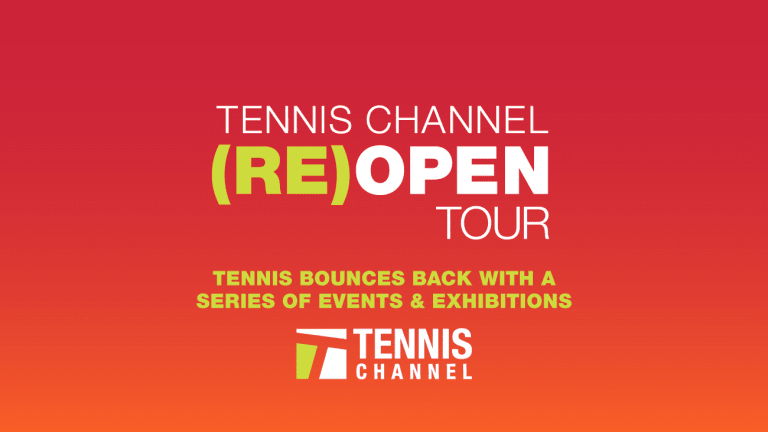Why Marion Bartoli's damning doubles comments miss the mark
By Matt Fitzgerald May 28, 2020Gabriela Dabrowski's perseverance shines bright on Tennis Channel 2's Second Serve
By Mitch Michals Mar 08, 2025Women's doubles is a must-see experience for tennis fans worldwide
By Joel Drucker Feb 02, 2025Gabriela Dabrowski reveals breast cancer battle: “Early detection saves lives”
By Liya Davidov Dec 31, 2024Wimbledon finalist Gabriela Dabrowski reveals she played through 2024 after breast cancer diagnosis
By Associated Press Dec 31, 2024How have Gabriela Dabrowski and Erin Routliffe developed into one of the WTA's most dynamic doubles teams?
By Joel Drucker Nov 17, 2024Felix Auger-Aliassime salutes Canadian tennis after Davis Cup exit, BJK Cup victory
By Stephanie Livaudais Nov 28, 2023Prime Minister Justin Trudeau leads cheers for Billie Jean King Cup champions Canada
By Baseline Staff Nov 15, 2023Nineteen years after tournament debut, Vera Zvonareva to play for WTA Finals doubles title
By TENNIS.com Nov 05, 2023Erin Routliffe and Gabriela Dabrowski, unlikely US Open champions, continue their journey to Cancun
By Joel Drucker Oct 26, 2023Why Marion Bartoli's damning doubles comments miss the mark
The 2013 Wimbledon champion believes a reduction in tour-level doubles events would allow more prize money to be funneled toward Challenger players. "I just don't understand because in doubles, you just don't make the same effort as a singles player."
Published May 28, 2020
Advertising
Former Wimbledon champion Marion Bartoli hasn’t been shy in sharing her opinions since leaving her post as a player to become involved with other roles within her sport, like commentating and coaching. The Frenchwoman’s latest take was every bit clear as it was candid—one that will surely ruffle some feathers in a time when tennis hopes to come out from the COVID-19 pandemic more unified than ever.
When asked on an episode of Match Points on how lower-ranked players could best be supported in the current climate, the 35-year-old shifted her attention to doubles. Bartoli questioned its weekly place on the tours and went as far to reduce the work ethic of players pursuing a specific career in the discipline.
“Why don't you get some of that money to the qualifier players, to someone who is playing only the Challengers? I just don't understand because in doubles, you just don't make the same effort as a singles player,” said Bartoli, who began coaching 2017 Roland Garros titlist Jelena Ostapenko last October in Linz.
“You don't practice so much, your routine is different. And they keep going week in and week out, getting that money, when actually the other ones playing Challengers are really struggling. I don't know if we have to stop doubles completely, but to get less money and give that money to qualification and others, that could be the solution.”
Em vídeo é ainda mais constrangedor. "And they just play doubles!" 🤦♀️
— Aliny Calejon (@alcalejon) May 26, 2020
➡️ https://t.co/grrvQMpftR pic.twitter.com/WqTM6Pjfmm
Advertising
Gabriela Dabrowski, a nine-time WTA doubles titlist and 2019 Wimbledon finalist alongside Xu Yifan, was quick to point out that everyone has a different definition of hard work. There are layers that determine the effort seen publicly, such as access to premium court time, plus pre-match standards that made Bartoli an outlier, according the two-time mixed doubles champion.
“Not everyone, not even singles players, will put in the same amount of work as Marion did... she would be out there practicing or doing exercises sometimes for hours before her matches, whereas players normally will warm up for 30 minutes to an hour max on match day,” Dabrowski said in an email, and later shared in a social media thread.
“I’m sure plenty of doubles players would love to get in even more hours on the practice court, but at most tournaments this would mean coming in at 7 a.m., which they don’t always allow you to do because the site isn’t open that early, or hitting late in the evening at 8 p.m. We never get enough court time during normal hours of the day as we are last on the priority list for practice courts.”
Bartoli's countryman Fabrice Martin peaked at No. 228 in singles before focusing on a career in doubles. Martin agrees with providing more support to the singles players Bartoli refers to, but doesn't understand why that would need to come at the expense of another group on tour.
“I think her comments are not very constructive for the sport, but we all have different opinions. Doubles has always been part of tennis and its history,” the 2019 Roland Garros doubles finalist said by phone. “She's right about helping singles players in qualies and [at the] Challenger level, but I think there are many other ways of helping lower-ranked singles players. Taking doubles out of tournaments is a bit extreme.”
While there is a pathway to earning a healthy living as a doubles player, the chunk of prize money up for grabs isn't exactly a cash cow. When the tours were suspended in early March, six of the top 100 prize-money leaders in the 2020 ATP season could be classified as doubles-only, with Australian Open winner Joe Salisbury topping the group at No. 39. In 2017, Dabrowski was one of seven players inside the WTA’s year-end top 100 prize money leaders, at No. 63, who could primarily be considered a doubles competitor (Martina Hingis led at No. 20).
“Marion is suggesting to take money away from those who earn on average less than 19 percent of what a singles player makes? You do realize that doubles players split their earnings after the 19 percent, right?” questioned Dabrowski, who currently serves on the WTA Players' Council.
“Doubles is all about tactics and finding solutions. You can’t always hit harder and have that be the solution. We use lobs, angles, finesse and net play, alongside power, to win. A player who plays predominantly doubles can have a longer career in tennis because the wear and tear on their body is not the same as a singles player. While Marion may consider this to be some kind of negative, for many it has enabled them to keep pursuing their dreams and to keep playing a sport they absolutely love for a lot longer than they may have otherwise. To suggest these athletes should disappear is unconscionable.”

Why Marion Bartoli's damning doubles comments miss the mark
© Getty Images
Advertising
Dabrowski was ranked a career-high No. 7 in doubles when the WTA suspended its season due to the coronavirus. (Getty Images)
The bulk of any tennis player's fiscal year, outside of those with lucrative endorsements in place, is centered around gaining entry at the four majors and their subsequent performances. At the 2020 Australian Open, a record 71 million Australian dollars (just over $47 million) was dished out, a 13.6 percent increase year-over-year, though the eight players advancing to the semifinal stage or better in the two singles draws accounted for 23.2 percent (16,530,000 AUD) of the total purse. A men's or women's doubles competitor needed to reach the semifinals at Melbourne Park (splitting 200,000 AUD) to exceed the prize-money check handed out to singles players losing in the first round (90,000 AUD).
“I think prize money is pretty top-heavy. Every round it doubles, doubles, doubles,” Vasek Pospisil told the AFP at the 2019 US Open. “Obviously the guys in later rounds are doing well. But should they be making more, too?”
Bartoli has a recent history of making eyebrow-raising remarks, some of which have rubbed current contemporaries the wrong way. At Wimbledon in 2018, she called out Nick Kyrgios and Gael Monfils while appearing on BBC 5 Live, declaring, “It’s pathetic to see them being childish. It seems they can’t grow up, they can’t be men and can’t take charge of their own lives.”
Kyrgios responded on Instagram by imploring Bartoli to, “Stop assuming you know what’s best for others when you think you’ve had a little success... We get it, we know you have to remain relevant, but I’ll give you a heads up, we don’t care what you have to say.”
Bartoli later replied to his post to clear the air, though the Australian brushed it aside with a “that’s not what you said lol but cheers” follow up.
During last year’s US Open, Bartoli criticized compatriot Benoit Paire for not shaking hands after losing to Aljaz Bedene in the second round, stating on Eurosport, “Inadmissible from start to finish, unforgivable, unspeakable. It looks like an eight-year old child who lost his match in a small club in the local tournament.”
Dis moi @bartoli_marion pas sûr que tu sois bien placée pour parler de ce sujet 🤷🏽♂️.. Tu avais serré la main de Virginie à Eastbourne en 2009? pic.twitter.com/KmqjONDGRK
— paire benoit (@benoitpaire) August 30, 2019
Advertising
Paire hit back immediately by claiming Bartoli was calling the kettle black in referencing her 2009 Eastbourne exit. There, she trailed Virginie Razzano, 6-4, 1-0, before retiring with a leg injury.
In February of this year, Bartoli said on The Tennis Podcast that the emerging generation has “a lot more ‘fake’ interaction with people,” believing they aren’t “feeling,” nor conveying their losses enough. The comment came not long after world No. 1 Ashleigh Barty brought her baby niece into her post-match press conference at the Australian Open after losing to eventual champion Sofia Kenin in the semifinals.
Part of Bartoli’s apparent gripe with doubles today is her belief that tournament earnings enable specialists to build large teams around them.
“I've been to some tournaments now with my player and I see they have crews, like six persons around them,” Bartoli said. “Even a singles player when I used to play, we couldn't afford to pay six persons to travel with us full-time. They can afford to pay six people and they just play doubles.”
Who exactly makes up the "they" Bartoli is referencing? Having previously worked in a role that involved recruiting ATP and WTA competitors, I can recount several examples where doubles-focused players shared coaches or were unable to budget for a dedicated team on the road. Travel stipends were a meaningful incentive for getting a contract across the line. When at tournaments, meetings were often pushed back so these professionals could receive treatment from tour-provided physios. If any had entourages walking the halls at the venue, every case that comes to mind involved a tour-dad wanting his family there.
“I have never seen doubles teams with six coaches around. There's maybe only five teams in the whole tour that travel with two coaches and a fitness trainer,” said Martin.
Added Dabrowski, “Some tennis federations might send a team of people to work with all of their players, but I don’t know one doubles player who travels with more than one or two people maximum, and even that is usually periodically.”
Point blank, Bartoli’s latest commentary is a series of sweeping statements. In a period where pro players of all levels have seen their regular income channel disappear, generalizing—and diminishing—the effort of a specific group simply isn't good enough. When the sum of the 2020 Australian Open prize money across the three doubles events (men's, women's and mixed) amounts to 11.9 percent (8,450,000 AUD) of the event's entire pool, just ahead of what the two singles champions walked away with (8,240,000 AUD), is doubles compensation really the root of the sport's pay inequality problem?

Why Marion Bartoli's damning doubles comments miss the mark
Advertising
Figures pulled from official 2019 ATP & WTA draw sheets
Receipts are necessary for such a bold assertion, and I'm not sure there are many for Bartoli to produce here. Just ask her countryman Nicolas Mahut, a four-time ATP singles champion who also holds a career Grand Slam in doubles.
“I'm jealous!!! I thought I had a large staff,” Mahut said in a translated Tweet. “Can you introduce me to the doubles player who travels with six people, please?”

Why Marion Bartoli's damning doubles comments miss the mark